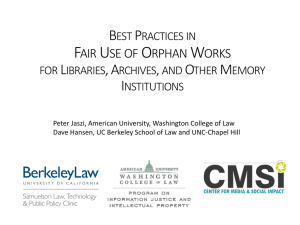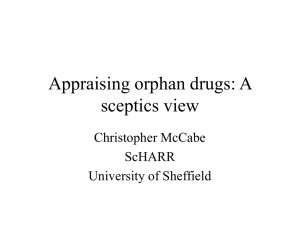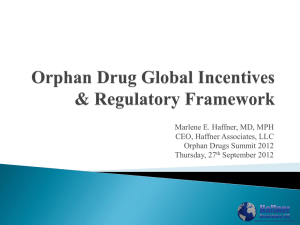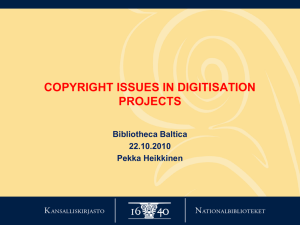What is an orphan drug?
advertisement
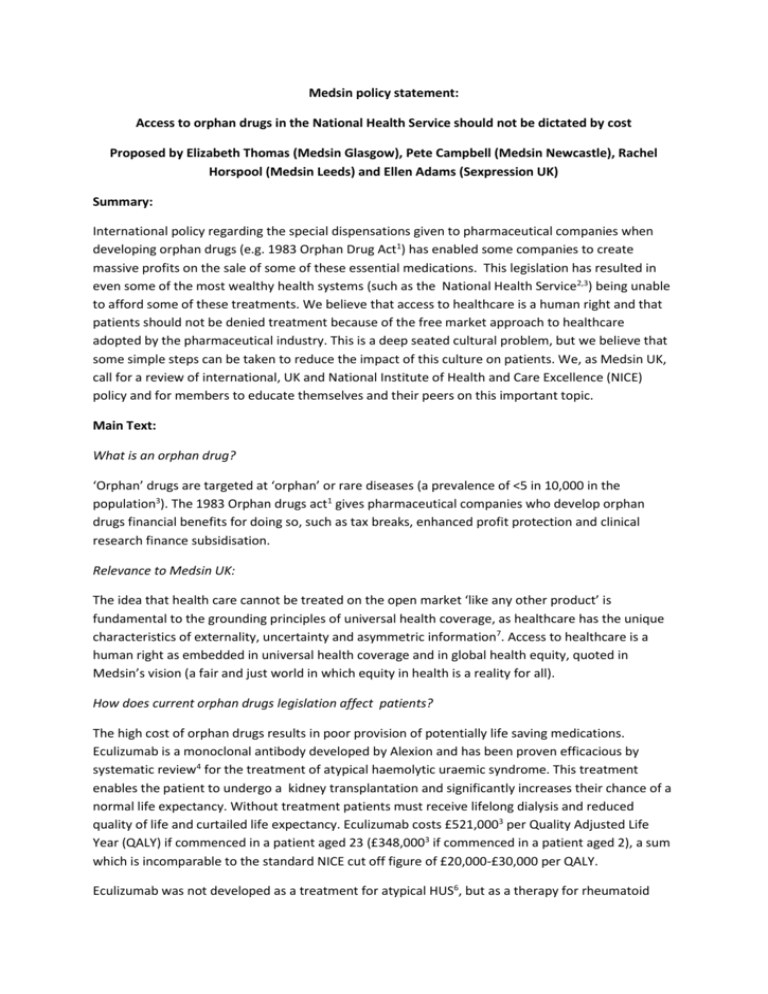
Medsin policy statement: Access to orphan drugs in the National Health Service should not be dictated by cost Proposed by Elizabeth Thomas (Medsin Glasgow), Pete Campbell (Medsin Newcastle), Rachel Horspool (Medsin Leeds) and Ellen Adams (Sexpression UK) Summary: International policy regarding the special dispensations given to pharmaceutical companies when developing orphan drugs (e.g. 1983 Orphan Drug Act1) has enabled some companies to create massive profits on the sale of some of these essential medications. This legislation has resulted in even some of the most wealthy health systems (such as the National Health Service2,3) being unable to afford some of these treatments. We believe that access to healthcare is a human right and that patients should not be denied treatment because of the free market approach to healthcare adopted by the pharmaceutical industry. This is a deep seated cultural problem, but we believe that some simple steps can be taken to reduce the impact of this culture on patients. We, as Medsin UK, call for a review of international, UK and National Institute of Health and Care Excellence (NICE) policy and for members to educate themselves and their peers on this important topic. Main Text: What is an orphan drug? ‘Orphan’ drugs are targeted at ‘orphan’ or rare diseases (a prevalence of <5 in 10,000 in the population3). The 1983 Orphan drugs act1 gives pharmaceutical companies who develop orphan drugs financial benefits for doing so, such as tax breaks, enhanced profit protection and clinical research finance subsidisation. Relevance to Medsin UK: The idea that health care cannot be treated on the open market ‘like any other product’ is fundamental to the grounding principles of universal health coverage, as healthcare has the unique characteristics of externality, uncertainty and asymmetric information7. Access to healthcare is a human right as embedded in universal health coverage and in global health equity, quoted in Medsin’s vision (a fair and just world in which equity in health is a reality for all). How does current orphan drugs legislation affect patients? The high cost of orphan drugs results in poor provision of potentially life saving medications. Eculizumab is a monoclonal antibody developed by Alexion and has been proven efficacious by systematic review4 for the treatment of atypical haemolytic uraemic syndrome. This treatment enables the patient to undergo a kidney transplantation and significantly increases their chance of a normal life expectancy. Without treatment patients must receive lifelong dialysis and reduced quality of life and curtailed life expectancy. Eculizumab costs £521,0003 per Quality Adjusted Life Year (QALY) if commenced in a patient aged 23 (£348,0003 if commenced in a patient aged 2), a sum which is incomparable to the standard NICE cut off figure of £20,000-£30,000 per QALY. Eculizumab was not developed as a treatment for atypical HUS6, but as a therapy for rheumatoid arthritis due to its effects on the complement system. When it was originally brought to the market for the management of atypical HUS, analysts expected it to cost between $100,000 and $200,000 per year. It entered the market at $390,000 per year. The estimated profit margin on the sale of Eculizumab is 22%6, but this doesn’t take into account budgets for advertising and publicity. The profit margin compared to cost price manufacture is likely to be significantly larger. What are the implications for patients? The high cost of these drugs means that not every NHS health board can afford to buy them for their patients; for example, Eculizumab is available for patients with atypical HUS in Carlisle but not in Dumfries, even though these 2 towns are only 50 miles apart. This ‘postcode lottery’ leads to inequity between patients in different parts of the UK. What are the implications for the NHS? There are many other orphan drugs that pharmaceutical companies are profiting from. The US Food and Drug Administration (FDA) awarded 26012orphan drug designations to developers in 2013, compared to 19012 from the previous year – indicating that orphan drug designation is increasing at an alarming rate. 60006 different diseases affect less than 1% of the population of the USA. If an orphan drug was created to treat each of these conditions at a cost of $300,000 per year, the cost of managing these conditions would be $1 trillion, the size of the global pharmaceutical market. The NHS has a finite budget and cannot afford to keep increasing pharmaceutical expenditure to meet the demands of small patient groups who require expensive medications at the expense of spending on other patients. What are the global implications? Increased understanding of gene mutations and disease-causing proteins has resulted in the identification of sub-groups within traditionally common illnesses -products such as Vertex’s Kalydeco which treats just 4%12 of the 30,000 patients with cystic fibrosis in the US and therefore meets the requirement for FDA orphan designation. This research is expanding the range of illnesses that could be treated with orphan drugs, thereby increasing demand for production of orphan drugs. If the future of the drugs industry is mainly in orphan drugs for small populations, it is not sustainable to provide such large incentives for every orphan drug. If this is the case, a potential solution would be for the government to fund research into finding ways to produce orphan drugs more cheaply. What is being done about this issue at a UK level? At present, the limit of total spending on branded medicines is capped at £12 billion9, but no cap has been set for the price of individual branded drugs. Last year, proposals were put forward by the UK government suggesting a ‘value based pricing’ approach, where the NHS would have dictated prices to companies, rather than the other way around. The goal of value based assessment was to ‘to improve NHS patients’ access to effective and innovative drugs by ensuring that they are available at a price that reflects the value they bring’.11This approach was hotly contested by the pharmaceutical industry, which suggested that value based pricing would decrease uptake of ‘innovative new medicines’ into the UK market. The latest statement to come out of NICE in their January 2014 board paper10 is that the department of health ‘does not intend to set an acceptable price, or after a NICE appraisal, formally state that a particular price has been accepted’. Instead, they are looking at a new scheme of ‘value based assessment’ where 2 further indicators are given to commissioning bodies to inform their decisions. Orphan drugs are not mentioned in the government document produced to attempt to regulate pharmaceutical pricing, The Pharmaceutical Price Regulation Scheme 20148. Medsin’s stance: We believe that current legislation surrounding orphan drugs is leading to unsustainable practice by pharmaceutical companies and that action needs to be taken to ensure patients in the UK and elsewhere have access to these life saving medicines. We believe this action could be taken by British and American governments who have the opportunity to limit profits and fund public research into orphan drugs. Finally, we believe Medsin members and the wider community should have an opportunity to be educated and to take action on this issue in order to tackle the inequities it creates. Medsin calls upon: 1. The British government to explore options of NHS led pricing for managing spending on pharmaceuticals 2. The American government, as the government who are responsible for the most pharmaceutical companies in the world, to review of the relevance of policies such as the 1983 Orphan Drug Act in modern drug development and possible revisions that could be made to those policies to prevent exploitation by pharmaceutical companies such as giving financial incentives to produce medicines with little established scientific understanding or to produce drugs with a specified profit margin. 3. The British government should fund research into techniques to reduce the cost of orphan drug development, in order to increase the sustainability of the orphan drugs market. Medsin agrees to: 1. Educate its members and health students about the orphan drug industry, value based pricing and the ethical implications of market driven pharmaceuticals. Medsin believes that education is fundamental in empowering students/future health professionals to campaign for change in the sales of orphan drugs. 2. Collaborate with activities such as UAEM and pharmaware to work on changing policy regarding orphan drugs as outlined above References: 1 Orphan Drug Act, U.S. Food and Drug Administration, 1983, found at http://www.fda.gov/regulatoryinformation/legislation/federalfooddrugandcosmeticactfdcact/signifi cantamendmentstothefdcact/orphandrugact/default.htm 2 Scottish Medicines Consortium: Eculizumab (Solaris), Advice, Published December 2007, found at http://www.scottishmedicines.org.uk/SMC_Advice/Advice/eculizumab__Soliris__436_07/eculizuma b_Soliris 3 NICE: Atypical haemolytic uraemic syndrome (aHUS) - eculizumab: evaluation consultation, published Jan 2014, found at http://www.nice.org.uk/guidance/highlyspecialisedtechnologyevaluations/atypicalhaemolyticuraem icsyndrome/ECD.jsp?domedia=1&mid=72E55146-9FAB-F6C2-8CB85D0A734E96B1 4 Rathbone, A systematic review of eculizumab for atypical haemolytic uraemic syndrome (aHUS), published renal medicine, 2013, found at http://bmjopen.bmj.com/content/3/11/e003573.abstract 5 NICE: Appraising Orphan Drugs, found at http://www.nice.org.uk/niceMedia/pdf/smt/120705item4.pdf 6 Matthew Herper ‘How A $440,000 Drug Is Turning Alexion Into Biotech's New Innovation Powerhouse’, Sept 2012, Forbes Magazine 7 Robert Evans, Strained Mercy: The Economics of Canadian Health Care (1984) 8 Department of Health; The Pharmaceutical Price Regulation Scheme 2014, published December 2013, found at https://www.gov.uk/government/uploads/system/uploads/attachment_data/file/282523/Pharmace utical_Price_Regulation.pdf 9 Cressey, UK backs away from ‘value based pricing ‘for drugs’, published 6/11/14 Nature news blog, found at: http://blogs.nature.com/news/2013/11/uk-backs-away-from-value-based-pricing-fordrugs.html 10 NICE: Board paper Jan 2014, found at http://nice.org.uk/aboutnice/whoweare/board/boardmeetings/PublicBoardMeeting22January2014. jsp?domedia=1&mid=AFFFE04B-BFBC-88FA-6D77D36F8ADE91B2 11 Barham, UK: Is Value Based Assessment the New Value Based Pricing?, published 27/01/14 Pharexec.com, found at http://blog.pharmexec.com/2014/01/27/uk-is-value-based-assessment-thenew-value-based-pricing/ 12 Cameron, Too much of a good thing; is the orphan drug act sustainable?, published 3/4/14 , Total Orphan Drugs found at http://www.orphan-drugs.org/2014/04/03/breaking-point-cost-increasingorphan-drug-designations/#sthash.EEiCBA2U.GsK1iZT8.dpbs Many thanks to Anya Gopfert (IFMSA Think Global) and Nathan Cantley (Pharmaware) for their help in editing this statement

